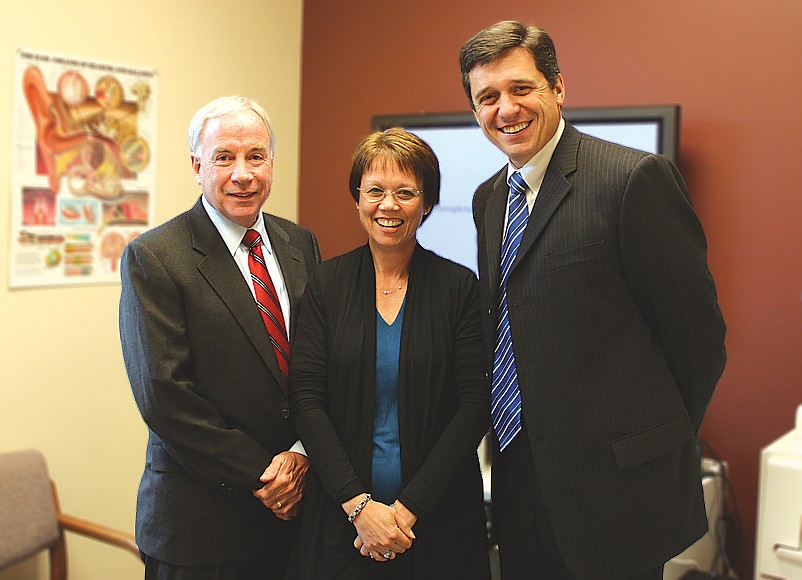New Help and New Hope for Tinnitus
April 30, 2012 at 6:00 a.m.
An estimated 50 million Americans are affected with tinnitus. Are you one of them?
If you have experienced a ringing, chirping, humming, buzzing or even roaring in your ears, then you know what it’s like to have tinnitus. For an estimated 50 million people, tinnitus doesn’t go away.
“The impact of tinnitus is wide-ranging,” says Terence Limb, Doctor of Audiology at Evergreen Speech & Hearing Clinic. Tinnitus can be so annoying that it leads to anxiety, frustration, fear, and depression. “It can also affect concentration and focus – even impacting memory,” he adds. “Tinnitus can profoundly affect people’s lives.”
A common cause of tinnitus is exposure to loud sounds, which can damage the sensory cells of the inner ear. “Even minimal hearing loss can cause problems,” explains Dr. Limb. Tinnitus has also been associated with ear infections, excessive ear wax, and sensory nerve disorders. Smoking, drinking alcohol or caffeine, and taking excessive amounts of aspirin or antibiotics may affect tinnitus.
Other conditions that can cause tinnitus include high blood pressure and brain tumors. Tinnitus can cause fear. “Something is happening and it is valid to seek out a diagnosis to make sure the problem is not a more serious one,” says Dr. Limb.
The good news is that new treatment options exist for tinnitus from high-tech solutions to learning simple tools to manage this condition.
“For so long patients have been told that there is no help. Happily, that is not the case anymore,” says Dr. Limb. “We now understand tinnitus and how to intervene. Help really is available.”
What to do if you think you have tinnitus
“Diagnostics is crucial and will tell us where the damage is,” says Dr. Limb. If you think you have tinnitus, start by being evaluated by an audiologist. An audiologist can help you determine the best options for managing the condition. If there are no specific medical issues involved, there are still several steps you can take to help reduce the severity of your tinnitus or help you cope better with the noise.
Tinnitus Management
“For all patients there is help and there is hope. Treatment will depend on what the underlying problem is,” says Dr. Limb.
• Counseling & Training. Evergreen Speech & Hearing audiologists educate and counsel their patients on how to deal with the problem. “Believe it or not, you can train your brain so that tinnitus symptoms are no more threatening than having shoes on your feet. Simple tools can start the process,” says Dr. Limb. “We teach patients how the brain processes stimuli and how to react to the stimuli in a more appropriate way. Patients can’t imagine ignoring tinnitus but I know from experience that you can learn to do it,” he advises. “When I am counseling a patient, oftentimes by the end of one session they leave with reassurance and some relief. It is very rewarding.”
• Hearing Aids. In many cases, someone experiencing tinnitus also has a hearing loss. The use of a hearing aid to amplify sounds can help to make the ringing or buzzing less distracting.
• ZEN. New advanced hearing instruments make use of fractal technology and offer a harmonic sound program called ZEN. This type of program generates soothing sounds and chimes that show great promise as a sound therapy tool to relax patients and distract their attention from their tinnitus. “This technology causes patients to associate the symptom with relaxation rather than anxiety,” reports Dr. Limb.
• Noise Suppression. Electronic devices with pillow speakers that produce “white noise” may help you to sleep better at night.
“Knowledge is power,” says Dr. Limb. “The more a patient understands tinnitus, the more effective the treatment strategies will be.”
Evergreen Speech & Hearing Clinic has been serving the eastside for over 30 years and have consistently led the industry in providing access to the latest technologies. For more information, visit www.everhear.com or call Redmond 425-882-4347; Bellevue 425-454-1883; Kirkland 425-899-5050. More information about Evergreen’s tinnitus program can be found at www.everhear.com/hearing/tinnitus/
This article appeared in the May 2012 issue of Northwest Prime Time, the Puget Sound region’s monthly publication celebrating life after 50.





